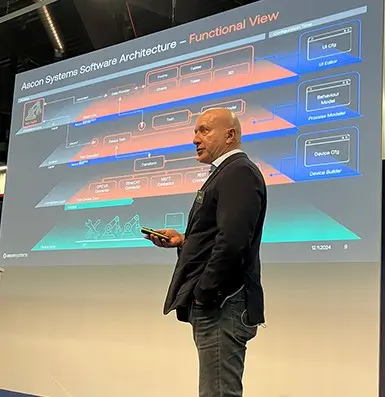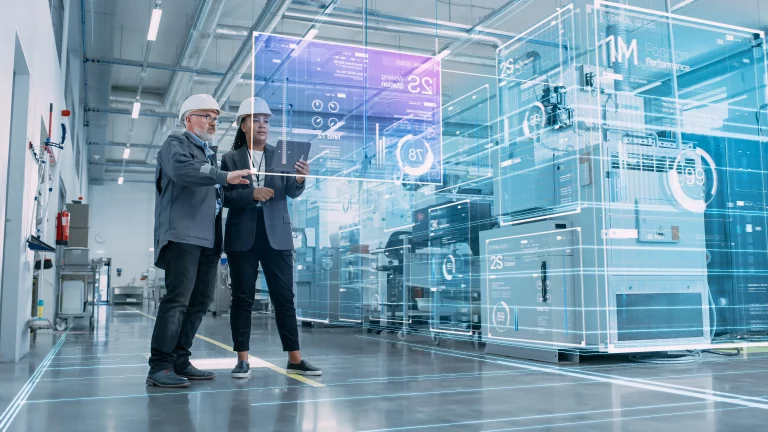Nov 25, 2024
Review of SPS 2024: Signs Point to Farewell for Traditional Control Systems
The automation industry is defying the economic downturn: This was the impression of Jens Mueller, CEO of Ascon Systems, following the SPS, Smart Production Solutions trade fair, held from November 12 to 14, 2024, in Nuremberg. Alongside digitalization and AI, three main topics, in particular, sparked discussions at the industry event.
SPS has been taking place in Nuremberg, Germany since 1997. It is one of the world's leading trade fairs for smart and digital automation and a highlight for the automation and manufacturing industry. This year, Ascon Systems participated with a booth for the first time and, in collaboration with Bürkert presented a demonstrator: It shows the interaction of fluidics technology with digital twins and its potential to deliver greater precision and efficiency.
Jens Mueller was on-site. In his review, three main topics emerged as central to the discussions:
- Is software-programmed control replacing PLCs (programmable logic controllers)?
- What advantages do cloud- and edge-based solutions offer?
- How does automation contribute to sustainability?
How does PLC-less production work?
Jens Mueller: "In PLC-less production, traditional programmable logic controllers (PLCs) are replaced by modern, software-based systems. There are many reasons for this shift: Traditional PLCs are often not compatible with new technologies such as AI or cloud computing, they have limited functionality and capacity, and they usually require skilled specialists for programming – resources that aren’t always available when needed. Companies seeking to make their production processes more scalable and flexible often find themselves constrained by traditional PLCs. Replacing them with software-defined systems enables shorter development cycles and seamless integration into existing IT infrastructures. We are already working on such systems with clients such as BMW and Bürkert. At this year's SPS, I had many discussions with visitors about what needs to be in place for PLC-free production, such as open communication standards and interoperable systems, and how virtualized control solutions can make production lines more agile and future-ready. The biggest concern, in my opinion, was how to successfully consolidate data from disparate silos to ensure it can be captured and managed by software. However, this is exactly what companies need to do to achieve transparency over processes and data flows, enabling greater efficiency and innovation.”

Jens Mueller, CEO, Ascon Systems
Does the future belong to cloud and edge-based solutions?
Jens Mueller: “Cloud and edge technologies are revolutionizing industrial automation. I would go further and say that they are a prerequisite for success. They allow data to be processed and stored either near production sites (Edge) or in the cloud. The benefits are enormous, including real-time analytics, global connectivity and flexible scalability. These solutions increase efficiency and support forward-looking applications like predictive maintenance and technologies such as digital twins in manufacturing. But most importantly, they play a critical role in security and safety. They enable dynamic and flexible security systems that can adapt to current needs, stay up to date with the latest encryption standards and, especially in combination with AI, detect anomalies and potential security threats before they occur. For us—particularly in collaboration with partners like NVIDIA and Threedy, as we develop solutions for the Industrial Metaverse—cloud- and edge-based technologies are fundamental. They ensure access to data anytime, anywhere, which is crucial for both Industry 4.0 and the broader industrial landscape. While it’s not an entirely new topic, it’s one that’s evolving rapidly. Its importance is growing significantly, as evidenced by how often it came up in discussions at the SPS."
How does automation contribute to sustainability?
Jens Mueller: “Automation technologies play a central role in promoting sustainable production methods. They help streamline processes, minimize resource consumption, ensure consistently high product quality, and reduce rejects. Automation often integrates IoT and data-driven technologies, which provide companies with valuable insights into their environmental performance. These insights allow businesses to identify weak points and actively pursue their sustainability goals. Smart control systems and data analytics also help save energy and reduce waste. Furthermore, automated disassembly and recycling processes facilitate the recovery of valuable materials, contributing to resource conservation. One example is our participation in an interdisciplinary consortium of industry and research partners, including Volkswagen AG, Liebherr-Verzahntechnik, and Deckel Maho Pfronten, as part of the ZIRKEL research project. This initiative explored how automation solutions can support large-scale battery disassembly. The results include efficiency gains and contextualized data that can be incorporated into the digital battery passport, set to take effect around 2027. Overall, automation approaches enable companies to align their ecological and economic objectives. These developments are crucial as the industry faces increasing pressure to operate more sustainably and contribute to climate goals. While some trade fairs give the impression that sustainability is no longer a priority, the SPS demonstrated that this is certainly not the case for the automation industry."
Continue reading:


